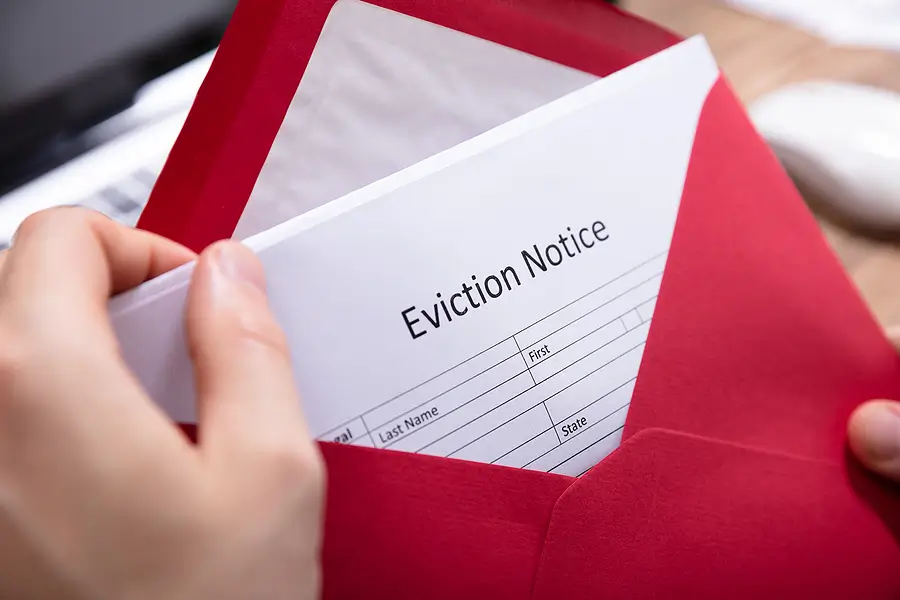As a landlord in Arizona, the eviction process can seem intimidating, but you can stay informed and in control with the right resources. This is a straightforward, step-by-step guide that will help you understand Arizona's eviction laws and give you the confidence you need.
Key Takeaways
- Timelines & Notices: You need to know when to give a 5-day or 10-day written notice before you file an eviction case.
- Court Steps: You will follow a set timeline from the start of the eviction action to the eviction hearing to the issuance of the eviction judgment.
- Success Tips: Organize your lease or rental agreement, document every step, and consult a landlord-tenant attorney if needed.
1. Groundwork: Lease and Compliance
Your lease agreement or rental agreement is your foundation. It must clearly define rent terms, reasonable late fees, property use rules, and outline lease violations (e.g., unauthorized pets or illegal activity). We strongly recommend that every Arizona landlord screens tenants using a comprehensive rental application, which includes credit and criminal record checks, to avoid potential headaches later.
2. Serving Proper Notice
Under Arizona law, to evict tenants legally, you must first provide proper notice:
- Nonpayment of rent: Serve a 5‑day pay-or-quit notice. If the tenant pays in full within that notice period, your rights reset, and you must wait for the next late rent. Partial payments can waive your ability to have the landlord file an eviction complaint unless there's a signed waiver.
- Lease violations or present threats to health or safety: A 10-day notice to cure or quit is mandatory for fixable issues. Irreparable acts (violence or drug sales) allow for an immediate eviction notice.
- Serving: Send notices via registered or certified mail, in person, or hire a certified process server. Document service properly—this protects you when you file the eviction action.
3. Filing the Eviction Action
If the tenant fails to comply within the notice period, you may file an eviction complaint at your local justice court (for rent disputes under $ 10,000) or superior court (for higher-value cases). Filing fees average $35–$218, depending on the court.
Include these in your filing:
- Copy of the eviction notice
- A clear timeline of rent owed or lease violations
- A copy of the lease or rental agreement
4. Eviction Hearing and Court Process
Your court date will typically be scheduled 3–6 days after filing; irreparable breaches may be heard within 3 days.
At the eviction hearing, the judge reviews:
- Proof of proper notice
- Evidence of unpaid rent or lease breaches
- Any tenant defenses (e.g., they paid or you didn’t file correctly)
If the judge rules in your favor, you'll receive an eviction judgment (also called writ of restitution), awarding possession and often allowing you to recover attorney fees and court costs.
5. Writ of Restitution & Sheriff Removal
Five days after judgment (or sooner for serious violations), a writ of restitution is issued. Only the sheriff or constable may physically remove the tenant.
Tenants typically get 12 hours to a few days to vacate. Any tenant's personal property left behind triggers a 14- to 21-day holding period, during which you must provide inventory and written notice. After this period, you can sell, store, or dispose of it under Arizona eviction laws.
6. Timeline and Challenges
The typical Arizona eviction timeline runs 3–6 weeks for uncontested cases. Contested or appealed cases may take longer to resolve.
Challenges include tenant counterclaims and improper notice. Regularly review court rules and track every step—from filing date to completion—in your property management system.
Expertise You Can Trust
Understanding the Arizona eviction process empowers you to manage risk, protect investments, and maintain tenant standards. But with complex notices, deadlines, and legal technicalities, oversight is easy—and costly.
Arizona Living Rentals specializes in full-service property management grounded in compliance with Arizona eviction laws. We handle everything—from drafting eviction notices to managing court filings, securing justice court hearings, and coordinating with sheriffs. Our in-house team collaborates with trusted landlord-tenant attorneys to ensure you avoid unnecessary court costs and minimize the risk of illegal actions.
Your Next Steps
Ready to simplify the eviction process while keeping your rental portfolio thriving? Explore our Services or Contact Us to start protecting your property—and peace of mind—today.
Frequently Asked Questions
Q1: Can a tenant stop eviction by paying late rent during the hearing?
Yes. If a tenant pays the full overdue rent plus attorney fees, court costs, and late fees before the judge rules, the eviction action stops under ARS § 33‑1368(B).
Q2: What if a tenant abandons the property after eviction?
Arizona law requires you to hold your tenant’s belongings for at least 21 days, notify them via certified mail, and then store, sell, or dispose of the items. Profits first cover unpaid rent and court costs, with excess returned to the tenant.
Q3: Can a landlord evict without a court order via self-help?
No. Changing locks, removing a tenant’s property, or shutting off utilities is illegal “self‑help.” Violation may result in double the actual damages plus fees.
Q4: What counts as “proper notice”?
The tenant must receive written notice—by hand, registered, or certified mail—detailing the issues, the notice period (5 or 10 days), and instructions on how to comply. Never skip this step or file early.
Q5: How do I minimize eviction risk?
Preventative screening using a rental application, clear lease agreement terms, proper handling of security deposits, and timely communication about lease violations can reduce eviction frequency and associated stress and costs.


